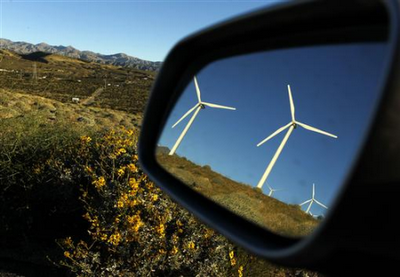
The technology needed to cut the world’s greenhouse gas emissions by 85% by 2050 already exists, according to a joint statement by eleven of the world’s largest engineering organisations, including the UK's Institution of Mechanical Engineers (IMechE).
The problem lies with politicians and the consequent lack of legislation and finance needed to ramp up efforts.
The professional bodies, together representing 1.2 million engineers, submitted their opinion last Friday to the South African Deputy High Commissioner as part of preparations for the UN Framework Convention on Climate Change which is to be held in Durban from November 28 to December 9, (COP 17).
They unanimously agree that not only is climate change real, and a danger, but that we can fight it by "generating electricity from wind, waves and the sun, growing biofuels sustainably, zero emissions transport, low carbon buildings and energy efficiency technologies" which have already "all been demonstrated".
The reason why we are not doing so on a sufficient scale to match the problem, their letter says, is "a desperate need for financial and legislative support from governments around the world".
“While the world’s politicians have been locked in talks with no output, engineers across the globe have been busy developing technologies that can bring down emissions and help create a more stable future for the planet," said Dr Colin Brown, Director of Engineering at the Institution of Mechanical Engineers.
Expressing hope that the December talks will achieve what those in Cancun last year and Copenhagen the year before failed to, he said, “We are now overdue for government commitment, with ambitious, concrete emissions targets that give the right signals to industry, so they can be rolled out on a global scale”.
The statement calls for agreements at Durban to:
- let greenhouse gas emissions peak by 2020, then substantially reduce
- make sure that policies do not unfairly impact on one particular industry or country
- emphasise energy efficiency first - "the best available measure to bring down emissions in the short and medium term".
- begin an intensive training programme in deploying environmental technologies
Pessimism for Durban talks
The Durban summit will focus on the future of the Kyoto Protocol, still the world's only treaty that mandates emission cuts. Its obligations expire at the end of 2012 and its future is uncertain because China and the United States, the world's top two polluters, are not subject to its constraints.
COP17 is seen as the last chance to make new commitments before then.
But with Japan, Canada and Russia having rejected a new round of carbon-cutting commitments, and the United States and the European Union having already said there is no chance of reaching a binding emissions deal in Durban, the problem is clearly a political, not an engineering one.
Maesela John Kekana, a senior policy adviser at South Africa's national Environmental Affairs department, told a parliamentary workshop on climate change this week that instead of a binding deal, "a second scenario" might be approved in Durban.
"This would involve the provisional application of a second commitment period for nations signed up to the Kyoto Protocol to reduce their emissions – due to come into effect in January 2013, after the first commitment period now in effect expires – while non-protocol nations like the US would agree to 'comparable obligations'”.
There would then be a transitional period until a new regime had been agreed after a review in 2015.
“That to me seems to be the more realistic scenario of what can happen,” Kekana said.
South Africa's environment minister has also called on rich countries to help poor countries reduce greenhouse gas emissions, ahead of the UN climate talks.
Edna Molewa said during the meeting on Monday, "We want to come out of the COP 17 saying that we have demonstrated our commitment, the will and capacity of our country and our people, as well as corporates, to lead a change revolution against climate change".
The stakes are perilously high, but pessimism is the order of the day.
A failure to make progress at the UNFCCC (UN Framework Convention on Climate Change) talks could result in a "collapse of the system", said NJ Mxakato-Diseko, ambassador at Large for COP 17/CMP 7, Department of International Relations & Cooperation South Africa, speaking last week at a Business for the Environment Climate Summit (B4E) in London.
This summit again beseeched political leaders to act, with over 250 high-level business, NGO and civil society leaders from 26 countries signing a document containing plans for industry commitments and political demands to speed up the change to a green economy.
The document will be communicated through to the Durban summit, to demonstrate, alongside the engineers' positive view, clear industry support for change to the climate negotiators.
The engineers' joint statement came out of The Future Climate 2 conference, also held in London last week, which saw international speakers from government, academia and engineering institutions discussing the technologies needed to combat climate change. The eleven engineering institutions that signed up to the joint statement are:
- The Institution of Mechanical Engineers (IMechE) (UK)
- Institution of Engineers (India)
- Association of German Engineers (VDI) (Germany)
- Japanese Society of Mechanical Engineers (JSME) (Japan)
- Association of Professional Engineers, Scientists and Managers (APESMA) (Australia)
- Danish Society of Engineers (IDA) (Denmark)
- Civil Engineer Organisation of Honduras (CICH) (Honduras)
- Swedish Association of Graduate Engineers (Sweden)
- Norwegian Society of Engineers (NITO) (Norway)
- Finnish Association of Graduate Engineers (TEK) (Finland)
- Union of Professional Engineers (UIL) (Finland)
The IMechE sees the 'green revolution' as "the lifeblood of UK manufacturing growth" and is organising a one day UK Energy Summit on Tuesday 1 November.
No comments:
Post a Comment